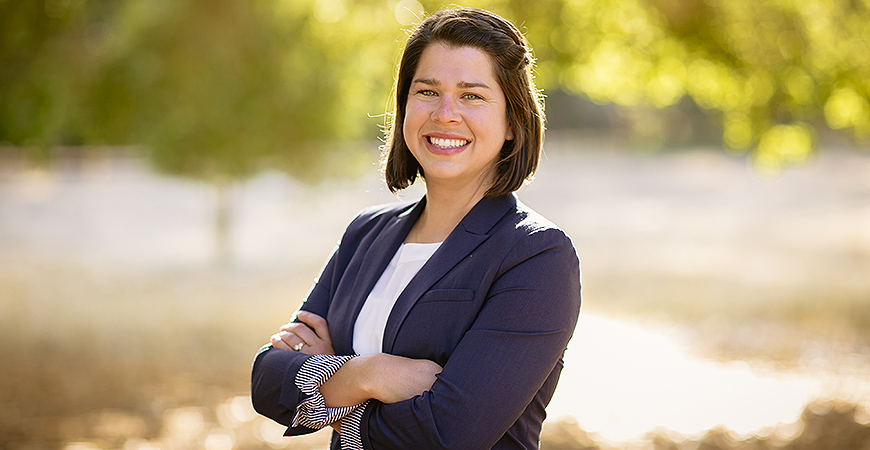
UC Chancellor’s Postdoctoral Fellow Hannah Palmer, Ph.D., was named as the 2022-23 Congressional Science Fellow by the Geological Society of America (GSA) and the U.S. Geological Survey (USGS), and will spend a year in Washington, D.C., working for a member of Congress or a congressional committee beginning in September 2022.
This prestigious fellowship is awarded to one earth scientist per year and is designed to provide opportunities for outstanding scientists to learn first-hand about federal policymaking while using their knowledge and skills to address today’s most pressing societal challenges.
“In the face of intersectional challenges, including climate change and global pandemic, the integration and consideration of science in public policy is more important than ever,” said Palmer, who is the first from UC Merced to be awarded this fellowship.
All fellows are managed through the prestigious American Association for the Advancement of Science (AAAS) Science Technology Policy Fellowship Program. The fellowship program is celebrating 50 years this year and more information about the fellowship can be found on its website.
Palmer, who is from San Luis Obispo, received a bachelor’s degree in marine biology from UCLA and a Ph.D. in Earth and Planetary Sciences at UC Davis.
As a climate scientist, she is interested in investigating the biogeochemistry of a changing world, impacts of environmental change on ecosystems and human dimensions of global change.
“I leverage the paleorecord to understand biogeochemical and ecosystem change across systems and timescales,” she said. “I am passionate about conducting science in the service of the public and leveraging science to inform decision making.”
Palmer works with paleoecology Professor Sora Kim and soil biochemistry Professor Asmeret Asefaw Berhe in the Department of Life and Environmental Sciences at UC Merced.
“My doctoral research focused on investigating marine sediment records to understand ecosystem responses to climate change in the Holocene — the time since the end of the last major glacial epoch, or ‘ice age,’” she said. “At UC Merced, I am investigating how wildfire severity impacts the biogeochemistry of landscapes following wildfire in order to both understand impacts of modern fire as well as improve how we understand wildfire in the past.”
To me, this fellowship is an unparalleled opportunity to gain hands-on experience in federal policymaking and to build skills that will provide tangible scaffolding on which I can continue to build a career at the science-policy interface.
As a fellow, she will be matched with a member of Congress and will serve as a legislative assistant in their office for one year. In this role, she will take on a variety of responsibilities, which may include briefing members and staff on scientific and technical topics, meeting with constituents and special interest groups, writing issue and policy briefs, drafting and negotiating text for legislation, coordinating oversight investigations, writing talking points, speeches and press releases, and serving as a liaison to and coordinating with committees.
“I am passionate about leveraging science for the public good and I look forward to putting my scientific training and background to work in tackling diverse challenges,” Palmer said. “To me, this fellowship is an unparalleled opportunity to gain hands-on experience in federal policymaking and to build skills that will provide tangible scaffolding on which I can continue to build a career at the science-policy interface.”
UC Merced’s research community has benefitted greatly from Palmer’s time on campus. She has mentored graduate students in the Berhe and Kim research groups while creating synergy among those interested in wildfire from across disciplines spanning all three schools: Engineering, Natural Sciences and Social Sciences, Humanities and Arts.
“Dr. Palmer’s Ph.D. research focused on past climate from the perspective of ocean records. In the last years of her Ph.D. and as a Chancellor’s Postdoctoral Fellow, she began to explore biogeochemical cycling and climate change through the lens of wildfire,” Kim said. “This range of research interests poises Dr. Palmer well for her upcoming position as the GSA USGS Congressional Science Fellow.”
“I am genuinely excited about learning in the fast-paced environment of Congress and to work on new and diverse challenges every day,” Palmer said.




